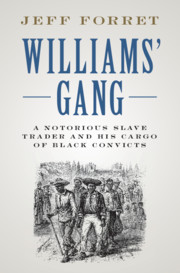Book contents
- Williams’ Gang
- Williams’ Gang
- Copyright page
- Contents
- Figures
- Abbreviations
- Acknowledgments
- Williams–Milburn genealogy
- Introduction The Slave Depot of Washington, D.C.
- Chapter 1 An Ambush
- Chapter 2 The Yellow House
- Chapter 3 Sale and Transportation
- Chapter 4 Mobile to New Orleans
- Chapter 5 Legal Troubles
- Chapter 6 The Millington Bank
- Chapter 7 State v. Williams
- Chapter 8 Slave Trading in “Hard Times”
- Chapter 9 Politics of the Slave Pen
- Chapter 10 Brothers
- Chapter 11 The Louisiana State Penitentiary
- Chapter 12 Closure
- Chapter 13 Perseverance
- Chapter 14 Violet
- Epilogue The Legal Legacy of the Domestic Slave Trade
- Book part
- Notes
- Index
Chapter 13 - Perseverance
Published online by Cambridge University Press: 16 January 2020
- Williams’ Gang
- Williams’ Gang
- Copyright page
- Contents
- Figures
- Abbreviations
- Acknowledgments
- Williams–Milburn genealogy
- Introduction The Slave Depot of Washington, D.C.
- Chapter 1 An Ambush
- Chapter 2 The Yellow House
- Chapter 3 Sale and Transportation
- Chapter 4 Mobile to New Orleans
- Chapter 5 Legal Troubles
- Chapter 6 The Millington Bank
- Chapter 7 State v. Williams
- Chapter 8 Slave Trading in “Hard Times”
- Chapter 9 Politics of the Slave Pen
- Chapter 10 Brothers
- Chapter 11 The Louisiana State Penitentiary
- Chapter 12 Closure
- Chapter 13 Perseverance
- Chapter 14 Violet
- Epilogue The Legal Legacy of the Domestic Slave Trade
- Book part
- Notes
- Index
Summary
William H. Williams relentlessly pursued the return of the convict slaves confiscated from him by repeatedly petitioning the Louisiana state legislature. He eventually proved successful. In 1857, the state restored to Williams all of the surviving transports from Virginia, plus the children born to the enslaved female convicts. Williams’ own lawyer sued him for non–payment for services rendered in the effort to regain the slaves forfeited to the state, but a judge sided with Williams because he believed the attorney’s lobbying efforts were contra bonos mores (against good morals). Williams went on to sell the convict slaves for several thousands of dollars. He died a little more than a year later.
Keywords
- Type
- Chapter
- Information
- Williams' GangA Notorious Slave Trader and his Cargo of Black Convicts, pp. 298 - 320Publisher: Cambridge University PressPrint publication year: 2020

